 When buying a home, it’s easy to focus on the down payment and mortgage rate, but don’t overlook property taxes. They can significantly affect your monthly payment and long-term budget and understanding how they’re calculated is key to making smart homebuying decisions.
When buying a home, it’s easy to focus on the down payment and mortgage rate, but don’t overlook property taxes. They can significantly affect your monthly payment and long-term budget and understanding how they’re calculated is key to making smart homebuying decisions.
We will break down the basics and highlight a few often-missed factors that could influence how much you’ll pay.
The Property Tax Formula
Property taxes are calculated based on the assessed value of your property multiplied by your local tax rate:
Assessed Value × Local Tax Rate = Annual Property Tax
The assessed value is determined by your local taxing authority and can be reassessed yearly or every few years depending on your location. This value isn’t always the same as your purchase price, it may be a percentage of market value or a figure set by recent local data.
Land Value vs. Structure Value
Most taxing authorities separate your property into two parts: the land and the improvements (like your home and any buildings). This matters because in many high-demand areas, land value can increase faster than the structure itself, even if no renovations have been made.
For example, if your home is in an area experiencing rapid growth or development, the land alone may account for a large portion of your tax bill. This is especially true for lots near commercial zones or in neighborhoods targeted for redevelopment.
“Highest and Best Use” Assessments
One often-overlooked factor in property taxes is the concept of “highest and best use.” This means your property may be taxed based on what it could be used for, not just what it is now.
For instance, a small home located in an area zoned for commercial or multi-family use might be assessed at a higher value because the land could potentially be redeveloped into something more profitable. Even if you have no intention of changing it, the possibility alone can drive up your assessed value and tax bill.
Tax Rates Vary by Location
Tax rates are typically set by a combination of city, county, and school district levies. Some states or counties reassess annually, while others only do so when a property is sold. Local laws may also include homestead exemptions, tax caps, or freezes that can help primary homeowners reduce or stabilize their tax bills.
Because these rules vary so widely, it’s essential to research how property taxes are assessed in the area where you’re planning to buy.
What Homebuyers Should Do
Before you commit to a property, be sure to:
- Review recent and projected property tax bills
- Understand how land and structures are valued locally
- Ask if the area uses “highest and best use” in assessments
- Factor in future tax increases based on development trends
Consult with a mortgage professional — they are a core part of homeownership costs. By doing your homework and asking the right questions, you can avoid surprises and budget confidently for your next move.




Comments on this entry are closed.